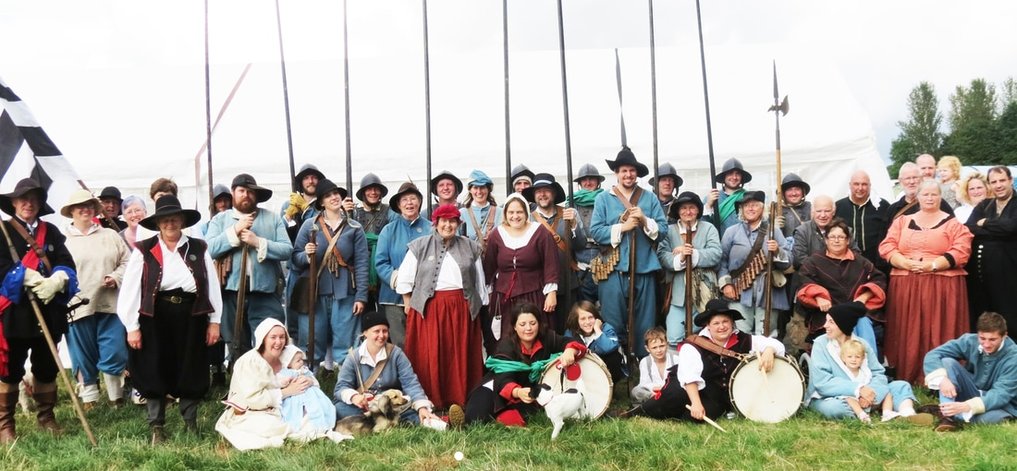
To all intents and purposes historical re-enactment societies like ours began in 1968 with the formation of the Sealed Knot. Interest and membership grew apace and soon the Roundhead Association was created, providing effective and independent opposition. This spirit of adventure, flavoured with a desire for a more democratic society, led to the disaffection of Sir Bevil Grenvile’s regiment with the SK’s autocratic leadership.
During the winter of 1971-72 Grenvile’s set out to make their point by recruiting a small army to re-enact the Battle of Babylon Hill, near Yeovil in Somerset, in April 1972. Despite the SK’s attempt to ban attendance, Grenvile’s were joined by several like-minded SK regiments, with the RA invited to provide a friendly enemy. It rained all weekend! Nevertheless, the event’s success in the face of a hostile SK hierarchy prompted Grenvile’s to declare the formation of the King’s Army in the West as a separate and independent society.
Meanwhile, back in 1970 a couple of tearaways from Norwich – Mike Plunkett and Dee Mason, then living and working in Somerset – had sampled this new pastime at the Battle of Cropredy Bridge, near Banbury in Oxfordshire. They recruited their friend Mike Warman the following year, and he became heavily involved in setting up the Babylon Hill muster.
Mike Warman and others formed the first new King’s Army in the West’s regiment out of Grenvile’s No 1 Company in August 1972, attending their first muster at Shepton Mallet in Somerset that same month. As they were Somerset folk, they dedicated their new unit to the memory of the infamous Sir Thomas Lunsford’s Regiment of Foote. Lunsford had commanded a regiment of trained bands raised in Somerset as early as 1640, for service against the Scots.
By the end of the year Lunsford’s were five companies strong, and Mike Warman became our first Colonel. The Dorset and Hampshire companies soon became Hopton’s and Winchester’s respectively, leaving Lunsford’s with companies from Street, Bristol and Yeovil. The rapid pace of recruitment and expansion in those days gives us some idea of how much sheer fun this new game was. Most of us were in our late teens to late twenties, with only a sprinkling of older heads adding maturity and leadership. Accuracy in kit and clothing left a lot to be desired!
In 1973 Mike Plunkett raised a coach load from Norwich, for the largest King’s Army in the West’s muster yet, at Nunney Castle in Somerset. Organised by Mike Warman, it featured participants from the SK, RA, Great Rebellion Society and the Sealed Knot of Jersey. With a handful of horse and a smattering of musket, the battlefield was dominated by bodies of pike up to fifty strong. The fighting went on for an hour and a half, then it was straight to the beer tent for free ale!
Here were born Norfolk Lunsford’s, who that autumn held their first banquet at Swannington Hall near Norwich (family home of new recruit Bob Wiles). Enjoying their first Lunsford event there, but not yet members, were Dee’s parents David and Joan Mason. These banquets fast became the ‘official’ Lunsford winter celebration, held every year until 1995.
Lunsford’s now had four companies; Street (led by Simon Dunevin), Bristol (Bob Wilson), Yeovil (Julian Kearns) and Norfolk (Mike Plunkett).The Army continued to grow rapidly. In London Blackwell’s were formed and two northern regiments came over from the SK; Pennyman’s and Tyldesley’s. A nationwide society was being formed, so in 1974 we became simply the King’s Army. The rest, as they say, is history!
Brian Bunce, July 2019